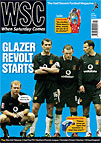 Lies, death threats, mysterious disappearances and a Nigerian youngster at the centre of a transfer wrangle between two of England's biggest clubs. PJ Bakke explains
Lies, death threats, mysterious disappearances and a Nigerian youngster at the centre of a transfer wrangle between two of England's biggest clubs. PJ Bakke explains
When Lyn’s Nigerian starlet John Obi Mikel signed for Manchester United a week after turning 18 in a deal worth up to £7 million, everything appeared rosy. The player posed delightedly in his new team’s shirt; Atle Brynestad, who bought the Oslo club for 10p six years ago, recouped some of the money he’s put into the club since; and United had snatched one of the world’s brightest talents from right under Chelsea’s nose. But within ten days the story moved from sport to the front pages with police chases, mysterious disappearances and accusations of death threats.
Mikel was one of a quartet of Nigerian youngsters at Lyn whose stay here was financed by Chelsea. Before he came, Mikel had signed contracts with agents John Shittu and Daniel Fletcher. Mere hours before signing for United, Mikel – aided by Lyn’s lawyers – terminated those contracts by letter. Ten days later Shittu came to Norway and took Mikel back to London, where the player eventually gave an interview claiming he’d been pressured by Lyn to sign for United, had changed his mind and now wanted to play for Chelsea. Initially, the prevailing view was the player had been coerced by unscrupulous forces into reneging on a lucrative contract. But when the lawyers have had their say, it may boil down to Lyn having sold a player owned by someone else.
African signings, invariably described as “colourful” by the media here, often represent a gamble. This is often the clubs’ own fault. Lillestrøm once bought a supposed Nigeria international who never got near the first team and the club had to dispel rumours that they had bought the wrong man; local rivals Vålerenga once signed a player purely based on reports that he could run fast. Flops are inevitable and hardly surprising considering the huge culture shock these players encounter. There have been notable success stories, though. Africans often become crowd favourites as they are seen to offer flair, pace and elegance in a league sorely lacking in those departments. Clubs are starting to realise that they offer potential financial rewards, too. Nobody is under the illusion that African players grow up dreaming of one day playing in the Norwegian league. It can, however, be a useful stepping stone, while Norwegian players, often overpriced and overrated, have become increasingly harder to sell.
While fans and club officials have been won over, other parts of the football community remain unconvinced. Åge Hareide, now Norway coach, went as far in 2003, when he was in charge of Rosenborg, as to say that the club should never buy Africans again. He had just sold MacBeth Sibaya, South Africa’s 2002 World Cup captain, to Russian club Rubin. According to Hareide it was impossible for African players to integrate at Rosenborg, seemingly forgetting that Sibaya was one of only two Africans ever at the club and that countless Norwegian players have failed to make the grade and “integrate” at Rosenborg.
The club may want to consider lifting their embargo, as they are being overtaken by rivals, some of whom have had very positive experiences with African players. None more so than Brann, who got two splendid seasons and a club record fee of £ 1.7m out of Seyi Olofinjana, whom Monaco recently loaned to Wolves.
Under FIFA rules clubs can’t buy African players under 18, but they can invite them over as students, let them train and sign them later, as Lyn did with Mikel. The players were originally brought over by disgraced agent Rune Hauge’s company, Profile, and granted exchange student status by the immigration authorities, who wrongly assumed that they saw other areas of the school aside from the football pitches and the cafeteria. Norway’s national sporting academy, NTG, with whom Lyn has formal links, got a lot of money from Profile to “cover expenses”. It has transpired that the players never attended classes and that Profile were acting on behalf of Chelsea.
The Norwegian FA have so far stayed quiet. They might have a problem convincing people of their impartiality in this case, given their recent dealings with Hauge. George Graham’s old buddy had his FIFA licence revoked years ago, but the FA still hired him to negotiate the TV deal with our leading clubs, for which he received a fee of almost £2m. Like the Mikel debacle, it would read better as fiction.
From WSC 221 July 2005. What was happening this month